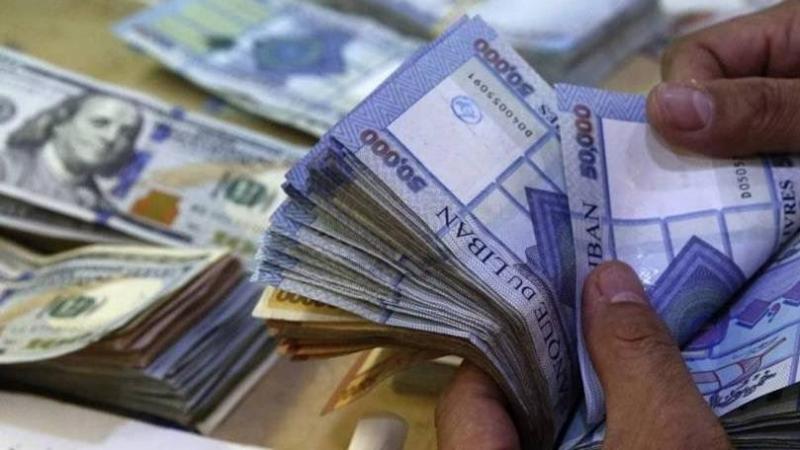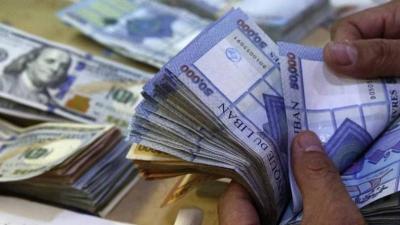The Lebanese economy is on the brink of a vortex of hyperinflation. Daily price increases for goods and services are met with raises in salaries and wages, which are immediately followed by a new wave of price hikes. Ineffective measures, which are incapable of meeting even the most basic life necessities, threaten to pull the economy into the center of the storm. At that point, control is completely lost, prices begin to soar rapidly, and the lira becomes mere colored paper with no real value.
### Salary Increases
As the exchange rate of the lira against the dollar surpasses 46,000 lira, the Index Committee is preparing to approve a new increase in salaries for private sector employees. It is expected that the basic salary will rise from 2.6 million lira to 4.5 million lira. This increase will be granted as assistance from outside the official minimum wage, which is still calculated based on 675,000 lira. As a result, private sector wages have been subject to three increases since the collapse began: the first worth 1,325,000 lira given in April 2022, the second worth 600,000 lira given in June 2022, and the third is upcoming.
### Transportation Allowance Increase
In addition to this meager raise, the year 2022 saw increases to the daily transportation allowance in three phases, bringing it to 95,000 lira today. At the end of last year, the decision was made to increase the daily transport allowance from 8,000 lira to 24,000 lira. This decision was amended by the Council of Ministers after just one month, raising the transport allowance to 65,000 lira, followed by another increase to 95,000 lira in August. It is expected that the transportation allowance will rise to 125,000 lira at the start of the year. Consequently, if the promised increases in wages are approved, the average income in the private sector will be around 11 million lira.
### Increases and Rising Prices
It is noteworthy that at the same time as the second wage increase in June, the price of the dollar against the lira was 28,000 lira, meaning the minimum wage of 2.6 million lira equated to 92 dollars. However, less than six months later, the exchange rate surged to 46,000 lira, and obtaining the same amount of dollars requires the equivalent of 4.3 million lira. This logic, possibly utilized to raise the basic wage to 4.5 million lira, will not be effective. "It won’t be long before the inflation caused by the lira's collapse, both normal and anticipatory, consumes these increases, forcing us to add another increase to wages," says Index Committee member Dr. Anis Bou Diab.
### Erosion of Increases
It is true that increases in lira wages in the private sector do not impact price increases, especially in natural economies. However, the absence of financial institutions and the disruption of banks lead to an expansion of the cash economy. Thus, "the surplus profits that are converted into foreign currency are not held to develop the economy and increase lending for investment, but rather for consumption and maintaining the status quo," according to Bou Diab. "Consequently, the issue with this increase lies in the redistribution of profits, which effectively detracts from the most vulnerable classes. Inflation is a regressive tax paid by the poorest and most fragile groups, which have limited income averages not linked to productivity."
### Banking Disruptions Worsen the Situation
Another critical element affecting the implications of these increases is the banking restrictions. Banks prevent private sector institutions from using their balances to cover operational expenses. They obligate them, through high commissions imposed on transfer operations, to opt for one of two solutions: either bring cash to the bank to complete transfer operations, or pay in cash. In either case, the cash economy expands. According to Bou Diab, "the money supply in circulation M1 becomes much larger than M2. Banks cannot generate accounting currency and rely on cash transactions that lead to this significant inflation. Even worse, the current monetary trajectory of the economy may eventually lead to a complete exit from the global financial system due to a loss of control and rising money laundering rates. While the economy stumbles left and right, it appears that banks are comfortable in their positions. They are eroding deposits in lira (by 25%) and dollars (by 70%) and minimizing their losses, with some even making profits from these operations."
### A More Just Temporary Solution
It can be concluded that despite the potential lack of impact of the increase in private sector wages on inflation, its effects will not be positive for workers due to the continuous erosion of salaries. In all scenarios, these increases are considered unfair and come after wages have lost significant value over the months. A more just temporary solution for workers, in Bou Diab's view, is to "add regular monthly increases to private sector wages, without calling it a 'sliding scale of wages', as this term 'frightens' private business owners. A new component could be added to the basic salary set at 2.6 million lira, called for example improving purchasing power, and paid monthly in line with the average change in exchange rates over the past thirty days." However, this proposal has been met with rejection from economic bodies which argue that periodic increases are not tied to inflation but to achieved growth. As long as the country is unable to achieve growth, wage and salary increases cannot be solidified.
### A Long-Term Solution to Protect Salaries
As for a permanent solution, growth should not be stimulated to break the vicious cycle the economy has entered. To encourage growth, according to Bou Diab, "strong economic principles, the rebuilding of a proper investment environment, regular institutional work, and an independent judiciary are needed. These factors cannot be achieved without ensuring stability in the exchange rate and entering into a program with the International Monetary Fund, especially since the scale of the crisis is no longer limited to gains or losses in the money supply but concerns more serious structural problems that monetary solutions can no longer address."
As wage and salary increases chase after the rising price train, the station grows increasingly distant. A wage proportional to inflation rates cannot be achieved without fundamental economic reforms far removed from mere financial calculations.
### How Much Have Prices Increased?
According to the International Information Organization, some experts have noted that the rise in prices since the onset of the crisis in 2019 until October 2022 has exceeded the officially declared percentage of 272 percent and may have surpassed 500 percent. Prices of imported goods have risen at a rate exceeding the increase in the dollar exchange rate, and the same applies to locally produced goods.
### The Minimum Cost of Living for a Lebanese Family
In mid-October, around a month and a half ago, the International Information Organization published a study indicating that the minimum cost of living for a Lebanese family of four ranges between 20 and 26 million lira, considering differences between living in a village or a city, and between ownership and renting. The study was conducted with an exchange rate of the lira against the dollar at 40,000 lira, while the price today ranges between 45,500 lira and 46,000 lira. Thus, the minimum cost of living for a family has inevitably risen to over 26 million lira.
### Hyperinflation
Hyperinflation is a type of inflation that occurs due to several reasons, the most prominent being an increase in the money supply in the market, leading to a decrease in purchasing power. Hyperinflation occurs when the rate of price increase exceeds 50 percent monthly.




